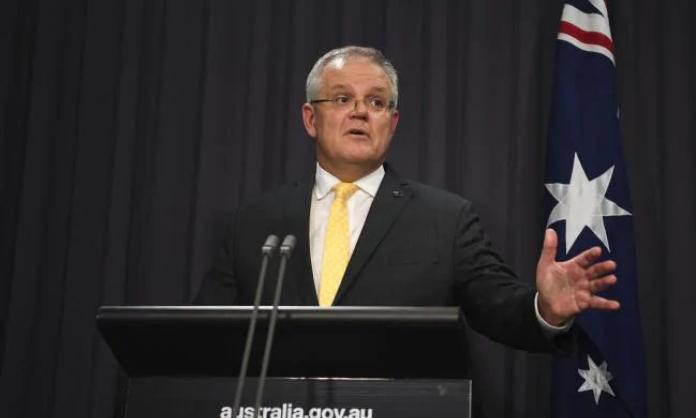When Shane Warne talks more sense about the national health emergency than the prime minister and chief medical officer, you know that the leadership of the country is seriously adrift.
On Wednesday morning, Warne expressed the disbelief of millions when he described Scott Morrison’s Tuesday night press conference as “a shocker”. “What I understood was ‘It’s essential unless it’s not. Then it’s essentially not essential, I can’t be clearer’”, he tweeted. “I know it’s impossible to please everyone as PM at the moment, but surely clear rules and lockdown for Australia as of NOW is the only decision – end of. Let’s learn from the mistakes other countries have made. Health has to be the most important thing for everyone”.
Warne may be known more for promoting hair transplants and plastic surgery than for his knowledge of pandemics, but he demonstrated a sounder grasp than the PM of the critical issues that could make the difference between a few coronavirus deaths and thousands.
The retired cricketer captured two essential points. First, that the staggered closures of businesses – along with wildly inconsistent attendance limits at weddings, funerals, dinner parties and barbeques – is only contributing to widespread confusion about what the public is meant to be doing. As Warne pointed out, how is it allowable for someone to buy a shirt in a shopping centre, potentially spending half an hour browsing the shelves, brushing past people in the aisles of the shop, but not to eat in the food hall?
Journalists have had a field day with Morrison’s list. Does the limit of ten at a funeral include the corpse? The undertaker? Why are hairdressers allowed to ply their trade but not beauticians? Why is a bootcamp of ten kosher but not a yoga class? How are barbers meant to keep the recommended distance of 1.5 metres from their clients as they cut their hair? Morrison seemed to have no clue what he meant by essential workers who must remain at their posts to ensure that basic services are maintained: “Stay home everyone, but if you have a job, you are an essential worker, so make sure you keep working”.
The whole thing is a mess. If it were only a matter of joshing at the prime minister’s expense, it wouldn’t matter a whole lot. But lives are at stake, thousands of them.
Morrison’s dog’s breakfast of measures and lack of clarity means that thousands of business are opening as usual every morning. Confusion is widespread and becomes more so after every incoherent press conference by a prime minister who, while lambasting people going to the beach, refuses to recognise his own responsibility for the situation.
The lack of clarity is only a symptom, however, of a much more serious failing on the part of the government. As Warne suggests, it is failing to take the dramatic steps that are now needed to prevent Australia racing to and then falling over the edge of the COVID-19 cliff.
This is obvious when it comes to schools, which are potential incubators of mass infection. At a time when thousands of medicos are urging that schools be closed, the government is insisting that they remain open. The inconsistency is stunning. The government now bans a group of ten people attending a prayer meeting in someone’s house, but demands the country’s 300,000 schoolteachers put themselves in front of classes of 25 or 30 children and young adults for several hours a day, five days a week.
Morrison’s rationale to keep the teachers in the classrooms is that if the schools shut down, millions of workers in other industries will have to stay home to look after their children. He isn’t concerned about any inconvenience that might result, only that the flow of profits across the economy would grind to a halt. Teachers are therefore essentially glorified baby-sitters. Teachers’ lives, those of their families and those of the students and their families are expendable. Business as usual must prevail. If that means sacrificing lives for profit, so be it.
The fact that the government is prepared to put profits before teachers’ and students’ lives explains why Morrison has so far not shut down all but what are genuinely essential industries – not just to “flatten the curve” but to stamp out the virus in Australia. Such a shutdown would not be unprecedented. The Chinese government did it, albeit in an extremely draconian way, while the New Zealand government is moving to a national shutdown this week.
As soon as you start to talk about shutting down everything but essential industries, however, a series of other measures follow if you are not to destroy the lives of those who will be stood down from work. Most obviously, the government must pay laid-off workers and the unemployed an allowance equal to the average wage to ensure that they can meet their outgoings.
With people restricted to their homes, government must ensure food delivery – whether by taking over and massively expanding existing delivery services such as Uber Eats or by redeploying the resources of Australia Post or something else. Governments must legislate to prevent evictions of tenants and mortgagees. With homeless people particularly vulnerable to infections, governments must commandeer empty properties to house them. Governments must provide childcare for the children of health workers and other essential service workers who must remain at their jobs.
These are just some of the most obvious measures that will be needed to ensure that a national shutdown does not lead to widespread suffering. They are also the only way of ensuring compliance with a shutdown – in the absence of such social supports, desperate people will break quarantine in their search for food or money.
Why hasn’t the Morrison government shut down the country in the way that the New Zealand government has, and why is it not talking about the kind of measures that could make a shutdown a feasible option for working class households dependent on a wage? Because it sees the opportunity for businesses to eke out a few more days of making money.
But it’s not just the money. Taking these kinds of measures would involve a dramatic reorientation of the entire country. State and federal governments may end up, in these desperate times, restricting the right of landlords to throw tenants onto the streets. The federal government is already doubling Newstart, albeit not until the end of April. But it is very unlikely to embrace the whole package of needed measures. Governments would need to replace the whole market economy with one in which provision of goods and the necessities of life depended not on capacity to pay but need. This would involve taxing business more to pay for services or borrowing more and blowing up the government debt.
The appointment of a slew of CEOs, along with a senior public servant best known for lying about refugees trying to drown their children, to the new National COVID-19 Coordination Commission tells you how much the Morrison government prioritises the lives of working class people.
Even more challenging for governments is that the kinds of measures needed to protect the lives of working class people during a national shutdown, if implemented, would normalise the idea that workers’ lives should not be at the mercy of private corporations – which in regular times decide if they work or starve on the basis of how much money can be squeezed from their labour. If governments provide workers with a living wage through state transfers during a health crisis, why can this not be done during any other capitalist crisis? Or outside a period of crisis, just as a normal way of ensuring citizens can survive, even thrive and not have to submit to degrading work?
The Morrison government is risking a health catastrophe because of its commitment to capitalist priorities. Its mishandling of measures needed to prevent the deaths of thousands of people is a reflection not of its incompetence, although it has demonstrated plenty of that, but its cold-blooded commitment to profits before human life.
The government may end up declaring a national shutdown. But we know that it will only do so when it is pushed either by a sharply increasing death toll or by the actions of the New South Wales and Victorian governments, which, for their own reasons, have been quicker to act and are creating facts on the ground. But if it does so, it will throw millions of workers to the wolves, providing only the skimpiest financial support to those stood down. Whether sick or healthy, workers’ lives mean little to the Coalition government and the bosses who back it.









